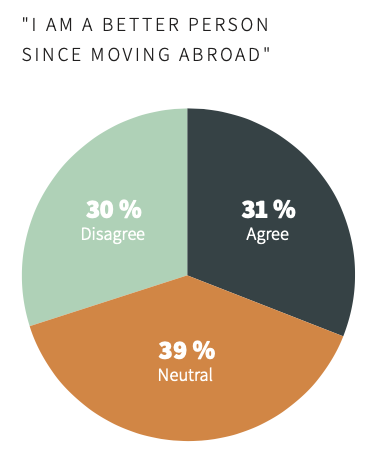
Moving abroad
– change you didn’t know you needed
Helene Hansel (Text), Celina Cristobal Chico (Design)
World citizens, according to the UN, are globally minded individuals who are members of multiple, diverse, local, and non-local networks rather than single isolated actors. Exposure to different cultures, new ways of life and identities all over the world can shape people into who they are, regardless of pinpointing a home geographically.
95% of students state life abroad had a lasting impact on their world view
A new life, a new country, a new culture can bring a new perspective: stepping out of your comfort zone is a challenge at first, but the unknown shapes you into who you are months or years later. New perspective opens your eyes and leaves the prejudice behind. Although living abroad raises a lot of questions about how you are going to manage living in a foreign country it could also be the best choice you ever make, especially as a student.
First and foremost, you are plunged into a new situation and although scary at first you will learn to be independent. Growing into your new role and learning to be self-resilient, is almost unavoidable when a lot of people you normally rely on are a plane or train ride away.
This does not mean that all things always look positive, home sickness can be a downside and missing friends and family is likely to occur. However, even this does not imply it has to be a bad stay abroad. Student life abroad for a semester can be life changing and alter your outlook and attitude, and at the same time temporary, offering just the right amount of being new but knowing you are coming back within a specific time frame.



William Maddux, a professor of organisational behaviour at INSEAD in France lead a study that goes to show a correlation between international student programs and attitude changes. Students enrolled in an international MBA program, were provided with multicultural engagement and it was observed how integrative and complex their thinking became. An adaptive and open attitude toward other cultures was found among these students, that aided them in being able to integrate multiple perspectives and connections between contrasting ideas into their thinking. Maddux’s study shows that living abroad and engaging with foreign cultures improved students’ critical thinking and their ability to make connections between disparate ideas.
Life abroad can improve your intercultural awareness, leaving you with a lifelong sensitivity to not only others but also your own culture. A pilot study by the International Journal of Intercultural Relations about short-term study abroad and intercultural sensitivity found that even short-term study abroad programmes resulted in students being better able to accept and adapt to cultural differences.



A given benefit is learning by doing when it comes to speaking a language. Daily tasks such as groceries or errands will automatically fall into your vocabulary and only improve if you decide to take up a language course. Not only the language barrier can be bridged, but also any verbal and non-verbal communication skills. Certain cultures are very expressive, using their hands or conveying much more emotions, while others foster directness and brevity. Becoming sensitive to these nuances in communication and showing respect for them, is facilitated in learning by doing.
A study by Harvard Business Review sought to prove a correlation between living abroad and clearer sense of self, where self-beliefs are confidently defined and stable. Studying how they define a sense of self and conflicts between parts of their personality, it was found that people who had lived abroad reported a clearer sense of self than people who had not.A given benefit is learning by doing when it comes to speaking a language. Daily tasks such as groceries or errands will automatically fall into your vocabulary and only improve if you decide to take up a language course. Not only the language barrier can be bridged, but also any verbal and non-verbal communication skills. Certain cultures are very expressive, using their hands or conveying much more emotions, while others foster directness and brevity. Becoming sensitive to these nuances in communication and showing respect for them, is facilitated in learning by doing.
A study by Harvard Business Review sought to prove a correlation between living abroad and clearer sense of self, where self-beliefs are confidently defined and stable. Studying how they define a sense of self and conflicts between parts of their personality, it was found that people who had lived abroad reported a clearer sense of self than people who had not.
SENSE OF
SELF SHAPED
Identity can be largely shaped by our environment, so moving abroad can change the way oneself and one’s life is perceived. In some cases, after having lived in multiple places, not being able to pinpoint home in a geographical sense leaves us questioning our identity. At the same time, exactly this feeling of trying to find ourselves leaves us with more resilience, and better adaptation skills.
Learning that identity is not necessarily geographically based, but more a sense of self that combines the best of both worlds can be challenging. Problems like feeling a personality switch between two languages, identifying more with a nationality that is not on your passport or trying to translate humour arise. At the same time this exposure to differences: nationalities, languages, cultures, religions, and beliefs helps people thrive and shape their own identity outside of parameters set by nationalities or place of birth.
Acceptance and tolerance are far greater when you have learnt about a different culture through immersion while living there than from any book you will read. Personal outlook becomes global rather than local, and one can envision a future in another country without fear of the unknown.
The effects of living abroad, the adaption to change needed develops people into multilingual, compassionate, accepting world citizens, individuals embracing social responsibility to act for the benefit of all societies, not just their own. Simultaneously, this does not mean that a new culture and way of life makes one wish to cut off from a native culture, or a certain place to call home. Living abroad brings many changes to a sense of identity and can lead to feeling out of touch with “back home”. Moving back to a place after some time abroad can make you feel foreign, even though you used to live there.

0
ERASMUS STUDENTS FROM
GERMANY LIVING ABROAD IN 2019
“Working in Madrid, improving my Spanish, and getting more in touch with my second nationality, was the best way I could have chosen to spend my internship. It shaped me into who I am now, and I fell in love with Madrid as a city and Spanish culture in general. I have never been so free and happy as during my stay abroad. This was absolutely the best time of my life, and I can see myself moving back in the very near future!”
– Celina, HNU Student
A second Place
to call home

Dutch working culture and daily life during my student internship abroad in Groningen taught me how to be spontaneous and enjoy the little things and I would go back in a heartbeat. My stay met my expectations and was very enriching, giving me the chance to greatly grow, both professionally and personally. Moving abroad for six months was one of the best decisions: new friends, a great team at work, new insights, discovering new places and making memories made it so worth it. Moments of doubt quickly resolved themselves as I got to know my way around and it was easy to be foreign in an internationally shaped community with connections through work and other international students!
With all this, I got to know a different country and started to feel at home in more than one place. Maybe geographically I can’t place a home, but I know where I feel the comfortable, make memories and what shapes me to be a world citizen.
– Helene, HNU Student



